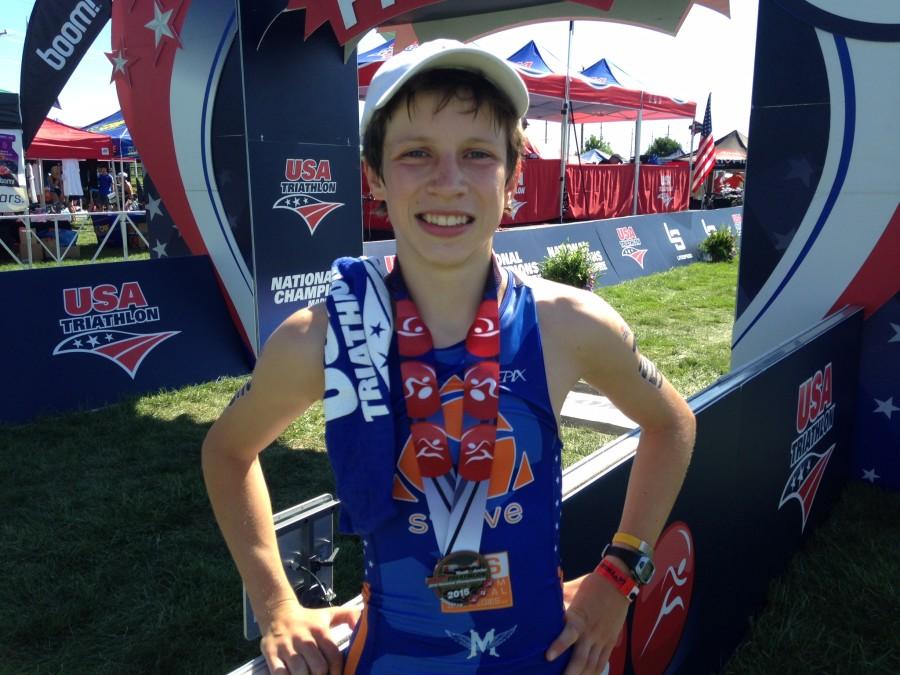Sophomore Andy Krueger Balances School and Triathlons
January 22, 2016
Although Andy Krueger is only a sophomore, he has already proven himself as one of the most hardworking people at La Salle through his grades and athletic abilities. Four sports, 25 hours of triathlon training a week, and then schoolwork are all challenges that he juggles as a triathlete. His dedication to the swim, soccer, track, and cross country teams, as well as his exceptional performance in triathlon competitions, have helped to earn him a place at the 2016 Sprint World Championships where he will compete against the best triathletes in his age group from around the world.
So how does one get such a competitive and difficult sport?
“I got into triathlons from my dad. As a young kid once or twice a year I would cheer on my dad in local races,” Andy said. “As I watched grown-ups battle it out on the race course I knew one day I would be competing.”
“When I was nine, one of my dad’s races had an official kids triathlon which my dad signed me up for,” he says. “After competing in that first race, I was hooked and haven’t looked back yet.”
When asked how one trains for triathlons, Andy said: “The short answer is I swim, bike and run as often as I can. Some workouts are speed or strength focused, others are technique or endurance focused. It really depends on what my coach wants me to focus on and when my next race is.” This training can take anywhere from 20 to 25 hours a week.
In addition to his triathlon training, which usually consists of two of the three disciplines at a time (bike, swim, run), Andy plays soccer and runs cross country in the fall, swims in the winter, and runs track in the spring. However, despite the incredible amount of commitment Andy has shown, he’s never considered leaving triathlons behind. “I have always loved the sport and don’t see myself ever not loving it,” he said. “Yes, there are times that the sport is more engaging and entertaining to me than others, but I have never thought about dropping triathlons. I see myself doing triathlons for as long as I’m able.”
“Triathlons are currently an NCAA emerging sport for women, but men haven’t been added yet. If men are added before 2018 I will definitely race triathlon on a college team. If not, I still plan to train in college,” he said when asked about his plans to continue doing triathlons. “As for a career, I would love to make a career out of doing what I love, but we will have to wait and see.”
Despite the huge amount of work that is needed to be put in by triathletes, Andy says that he is able to look past the grueling training and sees the sport as a challenge and as a way to make himself better. “My favorite part of being a triathlete is how many different aspects of the sport there is. You have to master three sports, plus work on technical aspects like transitions. This keeps me on my toes and never burns me out.”
“I love to race, and I like how tangible improvement is to see,” he said. “I also like how every race is new, unpredictable, and involves lots of mental toughness.”
When asked what his races entail, Andy said: “There are many different types of triathlons and different distances. There are standard triathlons, off road triathlons, draft legal triathlons, and many different distances from super-sprints to the famous Ironman distance (2.4 mile swim, 112 mile bike, 26.2 mile run). I currently am focusing on standard and draft legal sprint triathlons which consist of about a .5 mile swim, 12.5 mile bike and a 3.1 mile run.”
Andy is used to getting questions about how he manages school, sports, and everything else he wants to do, and he acknowledges that “it can be difficult to balance triathlon, school, and life,” he said. “Triathlons require a huge time commitment and don’t just stop when my workouts are over. I have to drive to many locations for training in a day, and make sure I’m eating the right food and a get good night’s sleep. I also have school work and everyday life stuff.”
Andy also says that he has to make many sacrifices in his life to stay on top of his game. “Since there are only 24 hours in a day I give up things to fit in my training. I hardly ever watch TV and sometimes can’t do every fun activity with friends.” he said. “For me, being on a tight schedule is better because I have to plan out my time. If I have set aside an hour to do homework I have to use it effectively, and can’t procrastinate. It’s controlled chaos.”






Paul Dreisbach • Jan 27, 2016 at 11:45 am
This guy’s a beast! Proof that you really can do it all.